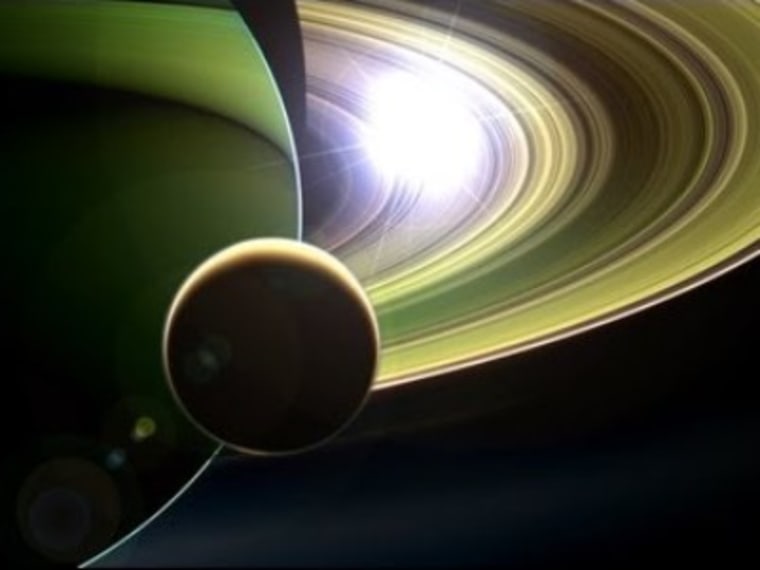Propylene, the key ingredient in household plastic containers, has been discovered in the atmosphere of Saturn's smoggy moon Titan — marking more firsts for planetary science.
It's the first time this particular hydrocarbon has been detected on a world beyond Earth, and it's the first new molecule to be identified by the Cassini orbiter's Composite Infrared Spectrometer. Similar hydrocarbons were found by NASA's Voyager 1 spacecraft in 1980, leading scientists to wonder why they weren't seeing the propylene.
"It's taken us 32 years, with a new spacecraft and a new instrument, to find it," said Conor Nixon of NASA's Goddard Space Flight Center, the lead author of a paper about the discovery. "It's kind of a missing link."
Don't expect to see Titanian Tupperware on store shelves anytime soon: The propylene in Titan's atmosphere amounts to just a few parts per billion, and it would take a factory to chain together the molecules and mold it into polypropylene plastic. "That plastic container at the grocery store with the recycling code 5 and the letters PP on the bottom — that's polypropylene," Nixon said.
Active alien chemistry
The find's scientific significance has more to do with how chemistry works on Titan, which many scientists regard as an analog to an age on ancient Earth before oxygen became a significant ingredient of the atmosphere.
"Titan as a whole has a very interesting chemical environment," Nixon told NBC News. "Because there's no free oxygen on Titan, it means this organic chemistry can just keep running and running and running like a huge natural experiment, and it can keep building more and more complex chemicals."
Voyager had detected two chemicals in Titan's atmosphere that are closely related to propylene — propane and propyne — but its instruments weren't sensitive enough to find the propylene. "We kind of knew it had to be there," Nixon said. "It's like the story of the three bears, and you're missing the middle bear."
In addition to propane, Titan's atmosphere and lakes contain variants of methane and ethane (including the ethylene that's an ingredient in polyethylene milk jugs). If all those hydrocarbons interact just right with the water ice that's thought to lie on Titan's surface, they can be transformed into the chemical building blocks of life, including amino acids.
"It is possible to produce amino acids," Nixon said. "Those are the types of things we'll be looking for in the future. We're going up stepwise in complexity to determine how the chemical processes work on Titan."
How the stuff was found
On Earth, propylene compounds are typically extracted from petroleum and processed into plastic containers as well as car bumpers and other consumer products. On Titan, the propylene and other hydrocarbons are produced when sunlight breaks apart the methane in the Saturnian moon's atmosphere. That gives the atoms a chance to reassemble into molecules of varying complexity.
Cassini's mass spectrometer turned up early hints that propylene was among the molecules produced, but it took the measurements from the Composite Infrared Spectrometer, or CIRS, to confirm the find. The results were published in Monday's edition of the Astrophysical Journal Letters.
"This measurement was very difficult to make, because propylene's weak signature is crowded by related chemicals with much stronger signals," Michael Flasar, Goddard scientist and principal investigator for CIRS, said in a news release from NASA's Jet Propulsion Laboratory. "This success boosts our confidence that we will find still more chemicals long hidden in Titan's atmosphere."
More about Titan:
- Life on Titan? Acetylene sparks chatter
- Titan sports a surprisingly thick icy shell
- Saturn moon may have ice floating in lakes
- NBC News archive on Titan
In addition to Nixon and Flasar, authors of "Detection of Propene in Titan's Stratosphere" include D.E. Jennings, B. Bezard, S. Vinatier, N.A. Teanby, K. Sung, T.M. Ansty, P.G.J. Irwin, N. Gorius, V. Cottini and A. Coustenis.
Alan Boyle is NBCNews.com's science editor. Connect with the Cosmic Log community by "liking" the NBC News Science Facebook page, following @b0yle on Twitter and adding +Alan Boyle to your Google+ circles. To keep up with NBCNews.com's stories about science and space, sign up for the Tech & Science newsletter, delivered to your email in-box every weekday. You can also check out "The Case for Pluto," my book about the controversial dwarf planet and the search for new worlds.
